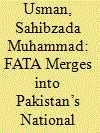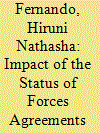|
|
|
Sort Order |
|
|
|
Items / Page
|
|
|
|
|
|
|
| Srl | Item |
| 1 |
ID:
183719


|
|
|
|
|
| Summary/Abstract |
The Look East Policy, now rechristened as the Act East Policy, was launched by India in response to the changing geo-strategic and geo-economic realities of the post-cold war era. The Look (Act) East Policy, however, is also being envisioned as a new engine of economic growth for Northeast India. The failure of India’s past experiment with the development of Northeast—ranging from protecting diverse cultural mosaic and gradual integration of tribal economies and institutions to modern political and economic structures to protecting the region through excessive security deployment and from politically accommodating different sub-national and ethnic aspirations to the pouring of developmental funds through increased public expenditure—prompted the Government to propose a new developmental model for the region under the Look (Act) East Policy. Under this model, the development of the Northeast is sought to be achieved through cross-border economic integration with the neighbouring Southeast Asian countries. One of the major hindrances underlying the development of Northeast India is its lack of access to the market because of the landlocked, bounded and insular character of the region (Verghese, 2001). Transnational economic integration with the neighbouring countries, therefore, is being looked at as possible means to provide Northeast India with its much-needed access to the market. Given the geographical proximity and historical-cultural ties between the Northeast region and Southeast Asian countries, the Look (Act) East Policy can facilitate a process of economic integration of Northeast India with the Southeast Asian countries. The expectation is that such integration would promote trade and investment in the region to bring economic growth and prosperity. This model of development as conceptualised under the Look (Act) East Policy is essentially neoliberal in character as it tries to develop the Northeast through the free play of global market forces. The state is supposed to merely facilitate the trans-regional economic integration by providing the basic necessary infrastructure. Accordingly, under the Look (Act) East Policy, India has undertaken a number of initiatives such as building sub-regional institutional and physical connectivity to promote such economic integration of Northeast with the Southeast Asian neighbours. Thus, there seems to be a growing consensus on the part of both the government and members of civil society in favour of this trans-regional market economy model proposed under the Look (Act) East Policy. Against this background, the present article endeavours to evaluate the success of the Look (Act) East Policy in terms its ability to accelerate the pace of development in the Northeast.
|
|
|
|
|
|
|
|
|
|
|
|
|
|
|
|
| 2 |
ID:
183723


|
|
|
|
|
| Summary/Abstract |
This article examines the Federally Administered Tribal Areas (FATA) in the Pakistani national system. In the current global war on terrorism, Pakistan’s FATA became a stronghold from jihadist to terrorist. After 9/11, under international pressure, the Pakistani government worked hard to implement its law in FATA. During this process, Pakistani forces push the Taliban out of tribal areas through military operations. To guarantee peace, prosperity and stability in the area, Pakistan combines mainstream tribal areas into the country by implementing a comprehensive legal framework for illegal areas. This article examines Pakistan’s integration options that allow FATA to enter its federal system and inspects the integrating tribal areas with Khyber Pakhtunkhwa (KPK) Province, which has great similarities with its race, religion and culture and is part of the federal system for 70 years. This article also focuses on the economic and administrative reforms necessary to establish real national control and FATA’s consolidation on an equal footing with other provinces of Pakistan.
|
|
|
|
|
|
|
|
|
|
|
|
|
|
|
|
| 3 |
ID:
183722


|
|
|
|
|
| Summary/Abstract |
Local governance has come into the centre of discourses after phenomenal shifts in functions, roles, and governing process of the central government. The increasing burden of the central government due to multidimensional challenges of modernisation and globalisation has necessitated the strengthening of local government organisations (GOs) through decentralisation of power. However, in most cases, the central government has retained the power to control local government. Factors such as central control, lack of capacity of the local government officials and lack of finances have made local government organisation of developing countries, including Bangladesh, non-functional. Therefore, many development organisations and donors have come forward with different assistances for strengthening these bodies. This article presents a review of an extant literate of GO–NGO teamwork for strengthening local government. The review finds that network among the central government, NGOs and local government could strengthen local governments in Bangladesh to effectively discharge its responsibilities.
|
|
|
|
|
|
|
|
|
|
|
|
|
|
|
|
| 4 |
ID:
183718


|
|
|
|
|
| Summary/Abstract |
The rise of China and its maritime expansion has threatened the US preponderance in world politics. The Indo-Pacific construct is America’s comeback and its strategy to engage with a rising Asia while countering its adversaries, especially China. Within this larger strategic dynamic, US defence agreements have become a curious subject of scrutiny, especially for small states in South Asia such as Sri Lanka, which is strategically located in the Indo-Pacific region. US defence agreements are manifold and have been signed with many countries in different regions. A vast majority of these, such as the acquisition and cross-services agreements (ACSA) and the status of forces agreements (SOFA), deal with technical matters concerning logistical support, conduct of US troops on foreign soil, and jurisdictional and basing issues. While the SOFA establishes the legal framework under which US armed forces operate in a foreign country, there are certain inherent features that are deemed highly controversial, such as the exercise of criminal jurisdiction, causing chronic and pervasive dangers to human security in host nations. While the United States is a ‘necessary evil’ for strategic hedging to keep Chinese aggressions at bay, the adverse impacts on host states could ultimately hinder US efforts to counter China in the long run. Sri Lanka, in particular, is an aid recipient of both the United States and China. Therefore, Sri Lanka must learn to re-evaluate its international policy carefully to preclude being divested in intense great power rivalry.
|
|
|
|
|
|
|
|
|
|
|
|
|
|
|
|
| 5 |
ID:
183721


|
|
|
|
|
| Summary/Abstract |
In order to understand the growth of Islamic fundamentalism in Pakistan, it is important to go beyond culturalist and orientalist explanations. As an alternative, this article foregrounds four factors that have been instrumental in projecting fundamentalism to a near-hegemonic position in the country. First, the fact that Pakistan has been imagined as a community of Muslims offers the fundamentalist an edge over secular rivals. This confessional intrinsicality is compounded by an official appeasement and patronage of the fundamentalists. Second, elaborate charity networks offering an ‘alternative society’ that caters to basic needs such as health, education and jobs have helped Islamic fundamentalism expand its outreach during a neoliberal period when the state shunned its welfare role. Third, the radical decline of the Pakistani left spawned a political vacuum that allowed the fundamentalists to become a mainstream platform for the public to vent their anger. Finally, imperialism, in particular the United States, contributed to the growth of fundamentalism in Pakistan in the context of the Cold War. This process apexed during the Afghan Jihad of the 1980s, and it laid the grounds for 9/11 and beyond.
|
|
|
|
|
|
|
|
|
|
|
|
|
|
|
|
|
|
|
|
|